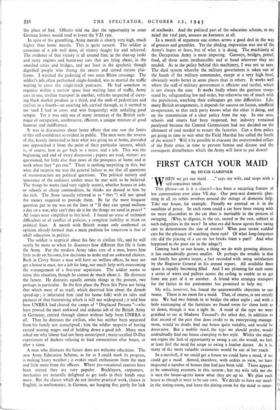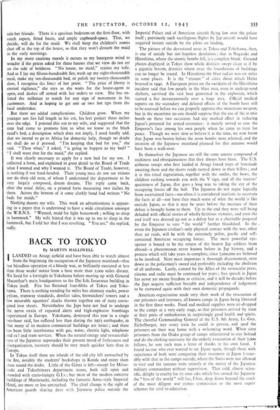FIRST CATCH YOUR MAID
By HUGH GARDNER
" WHEN we get our maid . .," says my wife, and stops with a self-conscious smirk. This phrase—or is it a clause?—has been a recurring feature of
her conversation ever since VE day. Our post-war domestic plan- ning in all its orbits revolves around the mirage of domestic help. Take our house, for example. Proudly we entered on it in the sunshine of peace. In each room could a cat have been swung with no more discomfort to the cat than is inevitable in the process of swinging. (Why, to digress, is the cat, sacred to the east, subject to such indignities in the west? In what era did house agents first swing cats to demonstrate the size of rooms? What past tyrant scalded cats for the pleasure of watching them run? Of what long-forgotten rite did the placing of a cat on hot bricks form a part? And what happened to the poor cat in the adage?) Coming back to our house, a thing we do with growing distaste,
it has undoubtedly grown, smaller. Or perhaps the trouble is that our family has grown- larger, a fact recorded with smug satisfaction by the Registrar General in his annual report. All available floor space is rapidly becoming filled. And I am planning for each room
a series of wires and pulleys across the ceiling to enable us to get from one part of it to another. A friend who arranges transport for the fairies in the pantomime has promised to help me.
My wife, however, has found the unanswerable objection to our
house. There is no room for a maid. That, of course, is not strictly true. We had two friends in to bridge the other night ; and with a little rearranging of the furniture we found room for them both to sit down, though it was a tight fit. A maid of the type we were gratified to see at Madame Tussaud's the other day, in addition to that record of the past that does credit to its enterprising manage- ment, would no doubt find our house quite suitable, and would be decorative. But a mobile maid, the type we should prefer, would undoubtedly find our house cramping to her style. Whilst she might not regret the lack of opportunity to swing a cat, she would, we feel, at least feel the need for scope to swing a feather duster. As it is, many of the more valuable ornaments would be out of her reach.
In a nutshell, if we could get a house we could have a maid, if we could get a maid. Armed, therefore, with orders to view, we have inspected a number of houses that had just been sold. There appears to be something eccentric in this system ; but my wife tells me she is sure the house-agents know what they are up to. We plan each house as though it were to be our own. We decide to have our meals in the sitting-room, and leave the dining-room for the maid to enter- taro her friends. There is a spacious bedroom on the first-floor, with south aspect, fitted basin, and ample cupboard-space. That, we decide, will do for the maid. We shall keep the children's rooms shut off at the top of the house, so that they won't disturb the maid in the early mornings. In my more cautious moods it occurs to my bourgeois mind to wonder if the prices asked for these houses that we view do not err on the side of boldness. " No house, no maid," rejoins my wife. And as I lay my fifteen-hundredth fire, wash up my eight-thousandth meal, make my ten-thousandth bed, or polish my twenty-thousandth shoe, I recognise the force of her point. " The price of liberty is eternal vigilance," she says as she waits for the house-agent to open, and dashes off armed with her orders to view. She has en- listed the milkman to watch for any sign of movement in his customers. And is hoping to get one or two hot tips from the local undertaker.
But there are added complications. Children grow. When my younger son lies full length in his cot, his feet project three inches over the edge. I pointed this out to my wife, and suggested that the time had come to promote him to what we know as the black maid's bed, a description which does not imply, I need hardly add, that we intend to go to Africa for domestic help, though no doubt we shall do so if pressed. " I'm keeping that bed for you," she said. " Then what," I asked, " is going to happen to my bed? " " I shall want that for the maid," she replied.
It was dearly necessary to apply for a new bed for my son. I collected a form, and explained in great detail to the Board of Trade what I wanted and why I wanted it. The Board of Trade, however, is nothing if not hard-headed. Their young men do not see visions nor do their old men, of whom I understand the department to be very largely composed, dream dreams. The reply came back, after the usual delay, on a printed form measuring two inches by three. Across the bottom of it some clerkly hand had written " No beds for maids."
Nothing daunts my wife. This week an advertisement is appear- ing in a paper that is understood to have a wide circulation amongst the W.R.N.S. " Wanted, maid for light housework ; willing to sleep in hammock." My 'wife hinted that it was up to me to sleep in the hammock, but I told her that I was revolting. " You are," she replied, sadly.



























 Previous page
Previous page